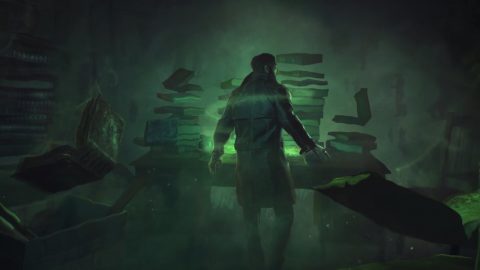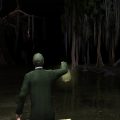The Call of Cthulhu tabletop game has had a weird space in video games, in that it has barely had a space at all. For as popular as Lovecraft style horror is among so many horror games, the big main thing born from that mythos has only popped up a handful of times. They began with the point and click series, tripped up with the overly ambitious and confused Dark Corners of the Earth, then sort of retreated into some mobile games mostly forgotten.
The first promising bit of news in a decade came when Frogwares was announced to be working on a Call of Cthulhu game, but they ended up dropping the project and using their work to make a new game alongside a new business partner, resulting in The Sinking City. That licensed game ended up being picked up by Cyanide Studio, a middle market mainstay mostly known for a lot of biking games, odd licensed games, and helping out with a RPG franchise alongside Spiders. This brings us to 2018, where the game finally released as a first major attempt in a video game to try and use the mechanics of the source material and translate them to a single player experience.
The end result is nothing like Dark Corners of the Earth in terms of content or tone. In terms of ambitious development that slowly undid itself to make a charming but ultimately confusing mess, it is very much like Dark Corners of the Earth, but the whiplash of mechanics replaced by confounding decisions in the details that harm the core structure. It looks like a great game, and feels like a great game for a few chapters, but the more you experience, the deeper the madness (of the developer’s game development decisions) becomes.
The story is set in 1924, following war vet and private detective Edward Pierce. He is suffering from dreams with lots of fish guts and spooky voices going on and on about the inevitability of destiny, and wouldn’t ya know it, ends up taking a case related to a painter who may be connected to those dreams. What starts as a look into the truth of a fire that killed a wealthy family at the small, off the coast of Boston island of Darkwater ends up morphing into a full on meeting with impossible creatures and beings, fishy cults (zing), and corrupt asylum workers.
What’s disappointing here is that the story isn’t deranged in the slightest. In fact, it’s extremely predictable, except maybe one late game twist that needed a tad more explanation to land right. After the bonkers stuff that Infogrames and Headfirst did with their stabs at the license, Cyanide’s fairly standard tale doesn’t really stand out. You can figure out the answer to every mystery by chapter two just by having the most basic knowledge of Lovecraftian lore, which deflates a lot of the events. Not helping is the middle portion is lacking in meat, including padding things with multiple visits to the asylum with diminishing returns.
The writing isn’t bad, mind you, just a bit too safe with the license. Pierce manages to be an entertaining and interesting guy no matter how you play him, and he has more than a few colorful and likable characters in his growing circle. Officer Bradley sticks out in particular, who seems to be introduced as a possible side antagonist, only to quickly become your investigation partner and reveal a kind and trusting soul under his harsh, scarred face and persona. The voice acting really sells everyone, limiting ham to the villains and allowing the more grounded characters get a bit of depth in the choices their actors make.
What does pop the entire way is the music, which starts up as effective mood setting music that doesn’t get your attention, to chaotic and inventive tracks towards the madness inducing end. It really goes out with a bang, with screeching violins and completely out of rhythm drumming that makes the whole piece feel like it’s about to collapse in upon itself, very fittingly. The same compliments can’t be given to the game’s look, at least on default settings.
Call of Cthulhu looks quite good, even with the iffy character models and animations, due to some ace environmental design making the world feel lived in. It really sells it when the otherworldly stuff creeps in, contrasting with the normalcy on display. The issue here is that the game uses a ton of post processing effects, and they are simply overpowering when all put upon one another. You also can’t toggle these in settings besides motion blur, so you have to do some editing on the back end to tone them down, which is what had to be done for these screenshots. It’s hard to tell just from an image or video, but actually playing this game as intended feels like trying to wade through a bowl of rotting pea soup. It is legitimately nauseating, and probably not in the way intended.
The gameplay itself is a mixture of a traditional adventure game with RPG elements that adds skill checks for actions. It’s a sensible idea that works well on the most basic level, offering some replay value (and encouraged by some writing doing a little meta nudging about changing destiny) via different options for solving problems. It’s a tried and true formula, giving different outcomes based on your build, or going a more Bioware style and keeping the ending list relatively simple but giving detailed changes in your decisions and skill check successes in little story details.
The system sort of falls apart once you realize the game is running on background dice rolls. Instead of hard number checks, there’s a randomized element where having a high stat in a skill doesn’t necessarily mean you will pass a check, just have a better chance of success. That’s fine for a larger game, but Call of Cthulhu is only a scant few hours. What this means is that you can do multiple playthroughs, but still end up doing a lot of things the same way because the RNG decided to forsake you. This makes the game’s very limited four endings also not really work, as those choices have minimal impact to them. You may also notice that dialog choices seem to have lesser impact than expected, like being nice or mean to Bradley at start having little change to his role in the story and general attitude.
The skills also feel poorly thought through. Strength is mostly useless compared to Elegance or Psychology’s uses in dialog, Medicine and Occult can only be built up via finding books around the world, and Investigation and Spot Hidden should just be a shared skill with something new added to fill the set. Investigation is central for purposes of exploring and certain dialog options, while spot hidden decides if you can pick up certain items or not, even when the assists are clearly right there. It is a baffling idea for a skill in a fully 3D adventure game, because you can just look and see the thing you want to interact with. It also runs on RNG as well, for reasons few can understand.
There’s also the problem of the stealth segments being quite bad. The AI feels unfinished, both super humanly observant at times, and also extremely easy to cheese. A lot of major chapters revolve around stealth with patrols placed close together, so if you didn’t like the stealth, you’re in for some rough patches. At least the weird gun play is reserved for very clunky ending sequences that are pretty easy. Puzzle design is also uneven for the few times they pop up, some quite difficult, and some dirt easy.
It should be noted there is a sanity system that plays into what endings you can get, with a few set points where you have to take some mental scarring, and others you can avoid or have to actively choose. The short term sanity system is a goofy camera wobble combined with overly busy filters that has no real gameplay consequences besides making you feel motion sick. Pierce gets wobble vision from hiding in lockers if you want an idea of how poorly thought out and implemented this was.
The basic structure of a great horror RPG is here, and at times shines through, but the game just can’t make things work as it wants them too. You can tell that there was trouble nailing down what was reasonable to do with the time they had while cutting back earlier ambitions, and you can feel that there were a lot of ambitions. Call of Cthulhu is not a bad game, but it is a disappointment, despite all the effort put in. Perhaps the most terrifying thing about it is knowing that if things had just gone a bit differently, the developers could have made something truly special, but alas, you can’t change destiny.


